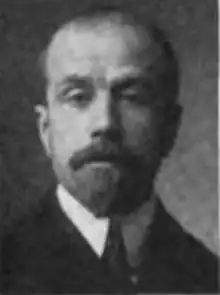James Phinney Munroe
James Phinney Munroe (June 3, 1862 – February 2, 1929) was an American author, businessman, professor and genealogist of the Clan Munro. He attended the Massachusetts Institute of Technology and graduated in 1882, although remained active in the affairs of the school. He published a number of mostly scholarly works. He was the father-in-law of Frederic Lansing Day who married his daughter Katharine. Munroe, who lived in Lexington, Massachusetts, was a president of the Lexington Historical Society and Treasurer and President of the Munroe Felt and Paper Company. He edited the second edition of Charles Hudson's History of Lexington.
James Phinney Munroe | |
|---|---|
 | |
| Born | June 3, 1862 Lexington, Massachusetts |
| Died | February 2, 1929 (aged 66) Boston, Massachusetts |
| Education | Massachusetts Institute of Technology |
| Occupation(s) | Writer, businessman |
Biography
James Phinney Munroe was born in Lexington, Massachusetts on June 3, 1862.[1]
He died in Boston on February 2, 1929.[2]
J.P Munroe... was a Boston businessman, active in local affairs and in the life of the Massachusetts Institute of Technology where he had served as Secretary of the Faculty 1882-9 under Walker's presidency. Munroe edited Walkers Discussions in Education (Holt, NY, 1899) as well as writing several books.
— The Correspondence of Alfred Marshall, Economist (pg. 386)
James Phinney Munroe, president of the National Society for the Promotion of Industrial Education, chairman of the Massachusetts Commission for the Blind, chairman of the Committee on Education of the Boston Chamber of Commerce, and secretary of the Corporation, Massachusetts Institute of Technology, began his 1912 book New Demands in Education...
— Taylored Citizenship: State Institutions and Subjectivity (pg. 100)
Books
- A Sketch of the Munro Clan: Also of William Munro Who Deported From Scotland, Settled in Lexington, Massachusetts and Some of His Posterity. 1900. James Munroe was a direct descendant of William Munroe.
- The Destruction of the Convent at Charlestown, Massachusetts, 1834 about the Ursuline Convent Riots. 1901.
- The Massachusetts Institute of Technology (illustrated). 1902.
- William Barton Rogers: Founder of the Massachusetts Institute of Technology 1904.
- The Educational Ideal: An Outline of Its Growth in Modern Times (A part of Heath's Pedagogical Library). 1911.
- New Demands in Education. 1912.
- The Business Man and the High-School Graduate. 1913.
- The New England Conscience. 1915.
- The War's Crippled: How They May Be Made Assets Both to Themselves and to Society. 1918.
- The Advantages of National Auspices of Re-Education. 1918.
- The Human Factor of Education. 1921. Reprinted in 2009 by BiblioBazaar.
- A Life of Francis Amasa Walker. 1923.
References
- Herringshaw, Thomas William, ed. (1914). Herringshaw's National Library of American Biography. Vol. IV. American Publishers Association. p. 10. Retrieved July 22, 2020 – via Google Books.
- "James P. Munroe Dies". Hartford Courant. Boston. AP. February 3, 1929. p. 18. Retrieved July 22, 2020 – via Newspapers.com.
- Miller, Charles R. (2001). Taylored Citizenship: State Institutions and Subjectivity. Praeger.
- Kollen, Richard (2004). Lexington: From Liberty's Birthplace to Progressive Suburb. Arcadia.
- Hannah, Matthew G. (2000). Governmentality and the Mastery of Territory in Nineteenth-Century America. Cambridge University Press. (Makes mention of "A Life of Munroe" and his book, "A life of Francis Amasa Walker")
- Marshall, Alfred; John K. Whitaker (1996). The Correspondence of Alfred Marshall, Economist. Cambridge University Press.
- Shrock, Robert R. (1977). Geology At MIT 1865-1965: A History of the First Hundred Years of Geology at Massachusetts Institute of Technology, Vol. 1: The Faculty and Supporting Staff. The MIT Press.
- Schultz, Jane E. (2004). Women At the Front: Hospital Workers in Civil War America. The University of North Carolina Press.
External links
- Books of James Phinney Munroe
- Excerpt from "Governmentality and the Mastery of Territory in Nineteenth-Century America"
- Excerpts from "Lexington: From Liberty's Birthplace to Progressive Suburb"
- Excerpt from "The Correspondence of[Alfred Marshall, Economist"
- Excerpt from "Taylored Citizenship: State Institutions and Subjectivity"